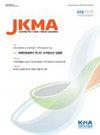Multidisciplinary treatment strategy for early colon cancer
IF 0.5
Q3 MEDICINE, GENERAL & INTERNAL
引用次数: 1
Abstract
Background: Treatment for early colon cancer has progressed rapidly with endoscopic resection and minimally invasive surgery. Selection of patients without risk of lymph node metastasis is necessary before deciding on endoscopic resection for early colon cancer treatment. We aimed to review the optimal multidisciplinary treatment strategies for early colon cancer, including endoscopy and surgery.Current Concepts: Pathological risk factors include histologic grade of cancer cell differentiation, lymphovascular invasion, perineural invasion, tumor budding, and deep submucosal invasion. These risk factors for predicting lymph node metastasis are crucial for determining the treatment strategy of endoscopic excision and radical resection for early colon cancer. Prediction of the depth of invasion in early colon cancer using endoscopic optical assessments is vital to determine the appropriate treatment method for endoscopic or surgical resection. Furthermore, optical assessment of pit and vascular patterns is useful for estimating the depth of submucosal invasion using magnifying chromoendoscopy and narrow-band imaging endoscopy. Performing an endoscopic and pathologic evaluation of the risk factors for lymph node metastasis is imperative when selecting endoscopic or surgical resection. Endoscopic treatments include cold snare polypectomy, endoscopic mucosal resection, and endoscopic submucosal dissection. In addition, appropriate surgical treatment should be recommended for patients with early colon cancer with a high risk of lymph node metastasis.Discussion and Conclusion: A multidisciplinary approach should be recommended to establish an optimized treatment strategy, minimize the risk of complications, and obtain excellent oncologic outcomes via patienttailored treatment in patients with early colon cancer.早期结肠癌的多学科治疗策略
背景:早期结肠癌的内镜切除和微创手术治疗进展迅速。选择无淋巴结转移风险的患者作为早期结肠癌内镜切除的治疗对象是必要的。我们旨在回顾早期结肠癌的最佳多学科治疗策略,包括内镜检查和手术。当前概念:病理危险因素包括癌细胞分化的组织学分级、淋巴血管浸润、神经周围浸润、肿瘤出芽和深部粘膜下浸润。这些预测淋巴结转移的危险因素对于确定早期结肠癌的内镜切除和根治性切除术的治疗策略至关重要。通过内镜光学评估预测早期结肠癌的侵袭深度对于确定内镜或手术切除的合适治疗方法至关重要。此外,利用放大色内镜和窄带成像内镜对窝和血管形态的光学评估有助于估计粘膜下浸润的深度。在选择内镜或手术切除时,对淋巴结转移的危险因素进行内镜和病理评估是必要的。内镜治疗包括冷圈套息肉切除术、内镜粘膜切除术和内镜粘膜下剥离。此外,对于淋巴结转移风险较高的早期结肠癌患者,应推荐适当的手术治疗。讨论与结论:早期结肠癌患者应多学科联合治疗,以建立优化的治疗策略,最大限度地降低并发症的风险,并通过个体化治疗获得良好的肿瘤预后。
本文章由计算机程序翻译,如有差异,请以英文原文为准。
求助全文
约1分钟内获得全文
求助全文
来源期刊

Journal of The Korean Medical Association
Medicine-General Medicine
CiteScore
0.50
自引率
0.00%
发文量
84
审稿时长
4-8 weeks
期刊介绍:
The Journal of the Korean Medical Association (JKMA) is the official peer-reviewed, open-access, monthly journal of the Korean Medical Association (KMA). It contains articles in Korean or English. Its abbreviated title is ''J Korean Med Assoc''. The aims of the Journal include contributing to the treatment of and preventing diseases of public health importance and to improvement of health and quality of life through sharing the state-of the-art scientific information on medicine by the members of KMA and other national and international societies.
 求助内容:
求助内容: 应助结果提醒方式:
应助结果提醒方式:


